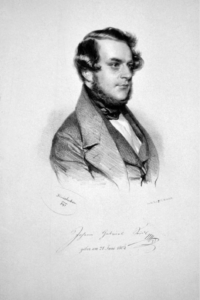The passing bell
(Poet's title: Das Zügenglöcklein)
Set by Schubert:
D 871
[1826]
Kling’ die Nacht durch, klinge,
Süßen Frieden bringe
Dem, für den du tönst,
Kling’ in weite Ferne,
So du Pilger gerne
Mit der Welt versöhnst.
Aber wer will wandern
Zu den lieben andern,
Die vorausgewallt?
Zog er gern die Schelle?
Bebt er an der Schwelle,
Wann »Herein« erschallt?
Gilt’s dem bösen Sohne,
Der noch flucht dem Tone,
Weil er heilig ist!
Nein, es klingt so lauter,
Wie ein Gottvertrauter
Seine Laufbahn schließt.
Aber ist’s ein Müder,
Den verwaist die Brüder,
Dem ein treues Tier
Einzig ließ den Glauben
An die Welt nicht rauben,
Ruf ihn, Gott, zu dir.
Ist’s der Frohen einer,
Der die Freuden reiner
Lieb und Freundschaft teilt,
Gönn ihm noch die Wonnen
Unter dieser Sonnen,
Wo er gerne weilt.
Ring out throughout the night, ring out,
Bring sweet peace
To the person for whom you are tolling!
Ring out into the far distance,
So a pilgrim like you will happily
Be reconciled with the world!
But who wants to go off
To those beloved others
Who have gone on ahead?
Was he happy to ring the bell?
Does he hesitate on the threshold
When someone calls “come in”?
Is it ringing for the evil son
Who still curses the sound
Because it is holy? –
No, it is ringing with such purity
As it does when someone who trusts God
Is coming to the end of life’s journey!
But if it is for someone who is exhausted,
Someone whose brothers have abandoned him, –
Someone left with a faithful animal
As the only being that has prevented his faith
In the world from being stolen: –
God, call him to yourself!
If it is one of the blessed
Who shares the joys of pure
Love and friendship,
Grant him more happiness
Under this sun
Where he would happily remain!
All translations into English that appear on this website, unless otherwise stated, are by Malcolm Wren. You are free to use them on condition that you acknowledge Malcolm Wren as the translator and schubertsong.uk as the source. Unless otherwise stated, the comments and essays that appear after the texts and translations are by Malcolm Wren and are © Copyright.
☙
Themes and images in this text:
Bells Doors and gates Friends Joy Near and far Night and the moon Pilgrims and pilgrimage Walking and wandering
Note by Peter Rastl: A “Zügenglöcklein” is a bell rung in Austrian churches as a call to prayer when a parishioner is dying.
Who casts not up his eye to the sun when it rises? But who takes off his eye from a comet, when that breaks out? Who bends not his ear to any bell, which upon any occasion rings? But who can remove it from that bell, which is passing a piece of himself out of this world?
‘Devotions Upon Emergent Occasions. Meditation XVII’ by John Donne (1623)
No man is an island, entire of itself; every man is a piece of the continent, a part of the main. If a clod be washed away by the sea, Europe is the less, as well as if a promontory were, as well as if a manor of thy friend’s or of thine own were: any man’s death diminishes me, because I am involved in mankind, and therefore never send to know for whom the bell tolls; it tolls for thee.
☙
Original Spelling and note on the text Das Zügenglöcklein Kling' die Nacht durch, klinge, Süßen Frieden bringe Dem, für den du tönst! Kling' in weite1 Ferne, So du Pilger gerne Mit der Welt versöhnst! Aber wer will wandern Zu den lieben Andern, Die vorausgewallt? Zog er gern die Schelle? Bebt er an der Schwelle, Wann »Herein« erschallt? - Gilt's dem bösen Sohne, Der noch flucht dem Tone, Weil er heilig ist?! Nein es klingt so lauter, Wie ein Gottvertrauter Seine Laufbahn schließt! Aber ist's ein Müder, Den verwaist die Brüder, - Dem ein treues Thier Einzig ließ den Glauben An die Welt nicht rauben: - Ruf' ihn Gott zu dir! Ist's der Frohen Einer, Der die Freuden reiner Lieb' und Freundschaft theilt, Gönn' ihm noch die Wonnen Unter dieser Sonnen, Wo er gerne weilt! 1 In the published version of Seidl's poems the word here is 'still' (quiet) not 'weite' (far). It is unclear of Schubert made the change or if he was working from an earlier version of the text.
Confirmed by Peter Rastl with Schubert’s source, Joh. Gabr. Seidl’s Dichtungen. Zweiter Theil. Lieder der Nacht. […] Von Johann Gabriel Seidl. Wien. Druck und Verlag von J. P. Sollinger. 1826, pages 26-27; with Lieder der Nacht. Von Johann Gabriel Seidl. Zweite, verbesserte und vermehrte Auflage. Wien, 1851. Druck und Verlag von J. P. Sollinger’s Witwe, pages 31-32; and with Joh. Gabr. Seidl’s gesammelte Schriften. Mit einer Einleitung von Julius von der Traun. Herausgegeben von Hans Max. Erster Band. […] Wien, 1877. Wilhelm Braumüller k.k. Hof- und Universitätsbuchhändler, pages 33-34.
To see an early edition of the text, go to page 26 [34 von 190] here: http://digital.onb.ac.at/OnbViewer/viewer.faces?doc=ABO_%2BZ179729407


